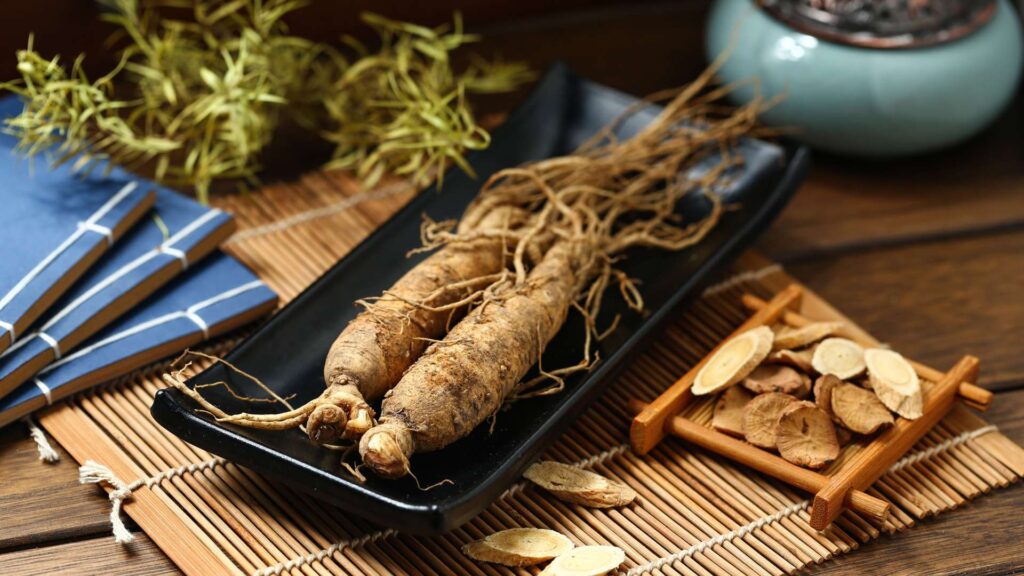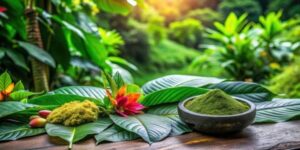Both ginseng and kratom have emerged as two highly prominent substances in contemporary times. Medical practitioners used these botanical substances extensively in traditional practices, which now receive recognition for their health advantages. The public is intensely focused on these two botanical substances while wanting to know about their similarities and differences.
In this blog, we’ll explore ginseng’s advantages and its applications, as well as its advantages compared to kratom throughout this blog discussion. This article will discuss the vital question regarding the proper combination of ginseng and kratom.
What is ginseng?
Ginseng is a tiny perennial plant that originates from Northern Asia. The plant has been part of traditional Chinese medicine practices because of its healing qualities throughout many ages.
Its medicinal root extends into a split-shaped structure with a white color, while the leaves display an oval shape with green pigmentation. People frequently employ the rhizome to treat diverse health conditions because it develops thick fleshy roots.
The research indicates that ginseng shows potential benefits for managing chronic fatigue as well as treating stress together with addressing erectile dysfunction. The herb potentially has benefits that include better mental focus, enhanced clarity, and strengthened immunity.
The supplement form of ginseng exists in three forms, including tea powder, capsules and supplements. Ginseng is a medicinal herb that demonstrates health advantages for body wellness.
What is Kratom?
The natural plant species of Kratom originates from Southeast Asian forests. The tree mostly appears in the areas of Thailand, Myanmar, Indonesia and Malaysia.
The leaves of the tree undergo collection at diverse maturity stages by local growers who dry them under the sun before creating either powder products or additional derivatives.
Different consumption methods of kratom include swallowing capsules, chewing leaves, using powder, making tea, and extracting the substance.
The scientific classification of this substance is Mitragyna speciosa, where the main pharmacological elements are identified as mitragynine and 7-hydroxymitragynine.
The active ingredients posited to have multiple benefits include analgesic, antipsychotic, and anti-inflammatory properties.
These compounds bind to mu and delta opioid receptor sites as they produce multiple physiological results.
Kratom alkaloids reportedly help with the following conditions:
- Alleviate discomfort
- Relieve stress and worry symptoms
- Uplift your mood
- Enhance vitality
- Induce euphoria
- Combat restlessness
- Improve mental alertness
Uses of Ginseng
Ginseng has been used in traditional medicine for a wide range of purposes. Here are some of the most common uses of ginseng:
- Boosting Energy and Reducing Fatigue: Many people consider ginseng to be a natural supplement for increasing energy levels. People use ginseng for its universal reputation to boost stamina alongside mindfulness while fighting against fatigue and exhausted energy levels.
- Supporting Cognitive Function: Several research reports indicate that ginseng shows the potential to enhance memory abilities, attention span, and total cognitive operations. Students and professionals commonly take ginseng as a supplement because of its popularity.
- Enhancing Immune Function: The traditional belief about ginseng suggests it strengthens immune functions, which allows the body to fight and resist infections and illnesses.
- Managing Stress and Anxiety: The adaptogenic properties of ginseng provide the body with stress-coping abilities, which lead to increased calmness.
- Supporting Physical Performance: Some athletes, along with fitness enthusiasts, consume ginseng to enhance their endurance capacity and minimize recovery time.
Benefits of Ginseng
Ginseng provides diverse advantages to users because it works as an adaptogen and contains many essential nutrients. Here are some of the key benefits supported by research and traditional use:
- Improved Energy Levels: Ginseng serves as a remedy for fatigue and produces effects that boost energy levels.
- Enhanced Mental Clarity: People who take ginseng note that it enhances their mental concentration and cognitive abilities.
- Immune System Support: The body can protect itself from infections and illnesses because of ginseng consumption.
- Stress Reduction: Ginseng shows adaptogenic quality, which helps the body better handle stressful situations.
- Anti-Inflammatory Effects: Ginseng possibly reduces inflammation according to scientific findings, although this relates to different long-term health conditions.
Kratom and Ginseng Comparison
Kratom and ginseng represent distinct natural remedies because each possesses dissimilar ways of functioning, multiple uses, and specific effects.
Here’s a closer look at how they compare:
1. Primary Uses
- Ginseng: The main objectives of this substance include preventing exhaustion, improving mental clarity, and sustaining general well-being.
- Kratom: Medical users utilize the plant to manage pain, yet achieve a mood boost and benefit from more restful moments among the various available strains.
2. Mechanisms of Action
- Ginseng: The body gains adaptogenic properties from this substance, which enable it to handle stress and balance itself. Ginsenosides are primarily responsible for producing the effects of this remedy.
- Kratom: Opioid receptors in the brain absorb this substance to produce pain relief and mood enhancement effects.
3. Potential Benefits
- Ginseng: Energy boost, cognitive support, immune system enhancement, and stress reduction.
- Kratom: The active compounds within strains offer users three main effects, which include pain relief, mood elevation, and relaxation, with the additional benefit of increased energy.
4. Safety and Side Effects
- Ginseng: Occasional moderate kratom usage is secure, but certain users might develop side effects such as headaches, along with digestive complications and problems with sleep.
- Kratom: A substantial number of people use kratom without harm, yet it comes along with conceivable dangers that can lead to substance dependence and withdrawal symptoms.
5. Legal Status
- Ginseng: Widely legal and available as a dietary supplement in most countries.
- Kratom: The substance has different levels of legality across various locations since authorities sanction its use in selected regions but limit or forbid it elsewhere because of security risks.
Potential benefits of combining kratom and ginseng
Ginseng does not function as a potentiator, and its consumption will not enhance the time the effects last.
Here are some of the potential perks of mixing these herbs:
- It could elevate the calming sensations: The dual relaxing elements within the combination of herbs create feelings of serenity in your body.
- It may alleviate discomfort: The anti-inflammatory benefits of ginseng and kratom together create potential solutions for people seeking relief from physical distress.
- It could induce euphoria: When combined, these specific herbs might create stronger euphoric effects, enabling them to serve as an effective treatment for worry relief.
- It might offer an energy boost: The combination of these herbs provides you with an opportunity to decrease kratom dosage while experiencing heightened energy levels.
Should You Mix Ginseng with Kratom?
Ginseng and kratom combinations prove interesting because their supportive effects match each other well.
The medicinal properties of ginseng include cognitive enhancement and energy elevation, whereas the main benefits of kratom are derived from relaxation and pain relief.
Scientifically, both substances could combine to create a well-balanced experience between increased concentration and energy levels alongside relaxation effects.
However, there are a few things to consider before mixing these two botanicals:
- Lack of Research: Scientific studies about the combined usage of ginseng and kratom remain scarce due to inadequate scholarly research on this subject.
- Individual Sensitivity: No two individuals are identical in body composition because various substances affect people differently. Each person’s reaction to the combined use of ginseng and kratom varies from beneficial effects to unwanted side effects.
- Dosage: Begin with minimum doses when combining ginseng and kratom while checking your body’s reactions. Too much usage of either substance will produce unwanted side effects.
- Consult a Healthcare Professional: Consulting with a healthcare provider becomes essential for users who want to mix ginseng with kratom, especially among individuals with health conditions or who use other medications.
Final Thoughts
Ginseng and kratom have served humans for centuries to provide therapeutic support during health maintenance. Traditional medical literature cherishes ginseng’s abundance because this root adapts to the body’s needs to increase vitality and mental clarity and minimize tension.
Different strains of kratom produce varying outcomes, so users choose it primarily for pain management and mood stabilization, together with relaxation benefits.
Your requirements and self-preferences will determine which between kratom and ginseng you select. People choose to combine these substances, but should exercise caution because such combinations lack research evidence and present possible safety risks.
Working with a healthcare expert and conducting research about ginseng benefits and its uses, along with its relation to kratom, remains vital before starting any exploration and use of these compounds.
These botanical products might improve your health condition however, they require careful management since they function as supplements.







